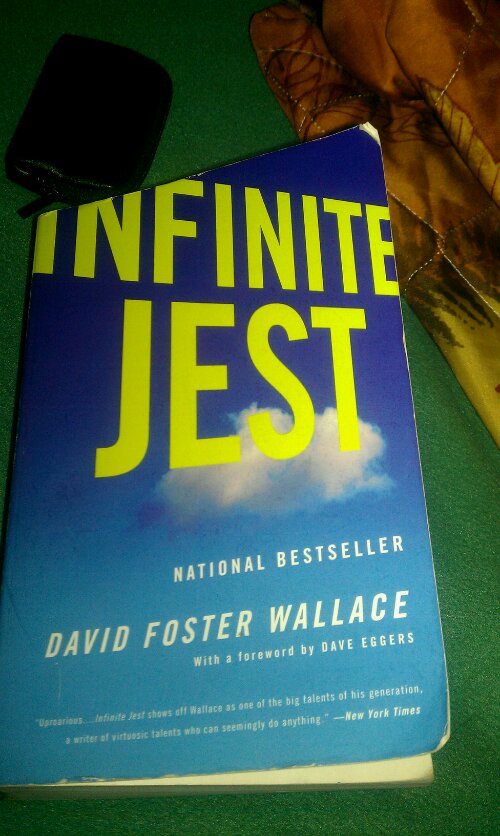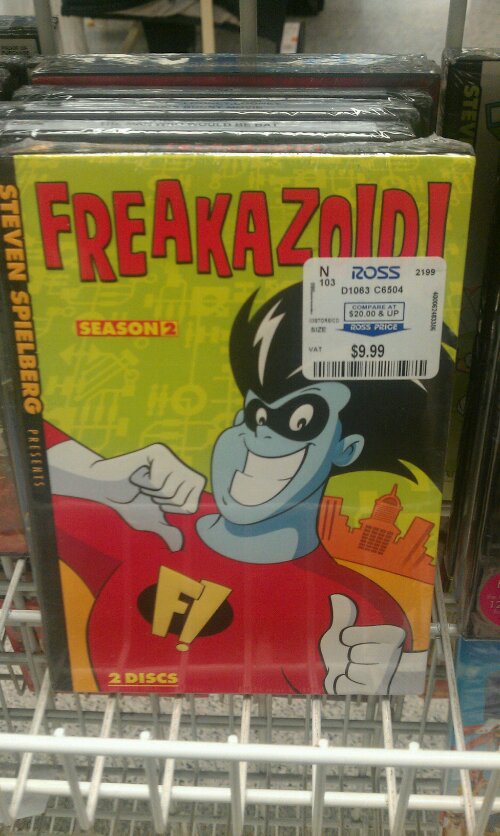
So, yeah, I’m Joe and I’m reading Infinite Jest. (This is like an AA joke…erg…it makes sense in the context of the book…)
The novel is frustratingly recondite (yep, that’s a word I guess), tops out at 1000 pages plus footnotes, and features an exhaustive cast of characters and wildly loopy, convoluted plot.
Well, it does and it doesn’t.
Sometimes it seems so simple. Like beautifully, organically simple. A child’s story even. But that’s after you habituate to the wild stylings of this brilliant dude known as David Foster Wallace.
Cuz this book is about simple things: love and the lack of love and addiction and slogging through the never-ending process of getting clean and wanting to kill yourself when you’re plagued by pain, psychical or otherwise. I mean there’s other stuff, Quebecois terrorists and tennis academies helmed (yes, helmed) by dipsomaniac apres-garde filmmakers obsessed with experimental optics and anticonfluential plotlines…I’m stealing words from DFW here, so try not to despise me. Or him. Cuz he’s awesome.
I’ve been reading a lot about DFW lately because he’s super smart and wonderful and died tragically in 2008 when he hanged himself in his home. Since I work in a suicide prevention lab and volunteered at a suicide and crisis-prevention hotline in college, I’m reasonably interested in this.
I study suicide. I research it and fly around the country doing my tiny minuscule part to try and fix it, as much as humanly possible. I read suicide notes and case studies and listen for those terrible news stories when someone throws herself in front of an Orange line train on the DC metro because she can’t take the pain anymore and then people on the train say things like “Are you kidding me? I’m on my way to fucking work!” Yeah lady, we’re all on our way to work. This dude just tried to kill himself under our train, please shut up.
This happened, btw.
I think about what it’s like to kill yourself on a regular basis, is what I’m saying. Not to be a downer here.
Here’s something to inject some levity into this morbid discourse:

Yeah, remember that? Freakazoid.
Where was I? Fuck. This is hard.
So, killing yourself. Yeah. I think about it a lot. I know people who’ve died by suicide, I’ve seen the bodies of people who’ve committed suicide (not a fantastic experience), I’ve talked to people who are in an actively suicidal state, I’ve talked to suicidologists, which is a real job, about suicide.
Where am I going with this? Well, yeah, DFW. Suicide figures into the book as well and my experience with it makes me enjoy the book that much more, plus every word is laced with that sad knowledge that the man who wrote it ended his own life. I promise I’m not always this depressing.
It hurts. It hurts to read this book and think about death and think about people hurting themselves, people I love hurting themselves. It hurts because I’ve felt like DFW before and I think about pain and shake my head and say, “I wish you were still here.” Whatever, I’m sentimental, suck it. I work in psychology so you should’ve expected this.
I’ve never met this man but I hate knowing he’s gone because he’s a beautiful person, like anyone who’s ever committed suicide. Please don’t bring up Hitler as a counterexample.
I find it so sad because he championed life, life in the face of pain and tedium and atrocity and hatred and depression and numbness and anger. Life, but he himself ended it. There’s a specific logic to the way a suicidal person’s mind works. It’s a special logic and people who aren’t suicidal look at it and say “Why? Why on earth would they do this? They have a wife, husband, kids, great job, etc.” Suicidal logic enables you to kill yourself even when you have kids, wife, great job, etc. It’s horrible but true. It develops over a long period of time and gets stronger and stronger when the person doesn’t get the proper care.
Yeesh, need some more levity.

Holy shit! Otters! Yeah they’re kissing.
Okay. Winding down.
I feel like I’m reading this book at the “right time” in my life. I gave it a shot during my senior of college, made it to page like 60, and got fed up.
Now, almost two years later, I can’t put the book down. Sure, it’s annoying sometimes, and he uses words no human would ever employ in normal conversation or writing, but whatever. It’s him. Enjoy the ride.
So what happened between then and now? Who cares? I will answer only Question 1. Lol. (I say lol, sorry.)
(Not sorry.)
Between 2010 and 2012, I think I sunk further and further mentally until I reached my, as they say in AA, “bottom.”
Well, maybe not my bottom, but within shouting distance of it.
“Yo!”
“O hai, dis Bahtum.”
“What’s up?”
“Errverthing…”
Jesus Christ. Now I apologize.
So yeah, I yelled at my bottom for awhile and then realized I should probably try to climb back up. So I’m now in a turn-around phase of my life and I’m feeling better and better, and this book is like a guide to maintaining your life and not giving in to shitty temptations and struggling and concentrating and finding little corn chips of happiness and accepting pain and sadness and still getting up at 5 am to go to work (I only have to do that sometimes luckily).
So why do I read it? Because I made myself and realized it was good for me and formed a good habit of reading it.
I’m not done with it, btw – hovering around the halfway mark actually. I honestly don’t want it to end right now. But it will. And then I’ll continue on with my life and read it again some other time. And hopefully a third time. Depends how long I’m alive, which I hope is at least 100 more years.
Get to it, Science.
Oh, and recondite: adj., dealing with very profound, difficult, or abstruse subject matter [really?! You use abstruse in this definition?! Wtf.]; beyond ordinary knowledge or understanding; little known; obscure.